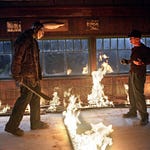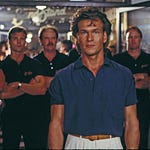On this week’s episode, Sonny Bunch (The Bulwark), Alyssa Rosenberg (The Washington Post), and Peter Suderman (Reason) talk about departing NYT film critic A.O. Scott’s thoughts on fandom and its effect on the way we talk about movies. Then they review HBO’s hit show The Last of Us and ask a very important question: Was Joel right? Make sure to swing by Bulwark+ this weekend for a bonus episode on the late, great Lance Reddick. And if you enjoyed this episode, share it with a friend!
Share this post

Is 'The Last of Us' the First Great Video Game Adaptation?
www.thebulwark.com
Is 'The Last of Us' the First Great Video Game Adaptation?
Plus: A.O. Scott vs. fandom!
Mar 21, 2023
Across the Movie Aisle
Audio
Here's the elevator pitch: It's "Left, Right, and Center" meets "Siskel and Ebert." Three friends from different ideological perspectives discuss the movies and controversies (or nontroversies!) about them.
Featuring bonus Friday episodes exclusively for Bulwark+ members.
Here's the elevator pitch: It's "Left, Right, and Center" meets "Siskel and Ebert." Three friends from different ideological perspectives discuss the movies and controversies (or nontroversies!) about them.
Featuring bonus Friday episodes exclusively for Bulwark+ members.
Listen on
Substack App
Apple Podcasts
Spotify
Overcast
RSS Feed
Recent Episodes















Is 'The Last of Us' the First Great Video Game Adaptation?